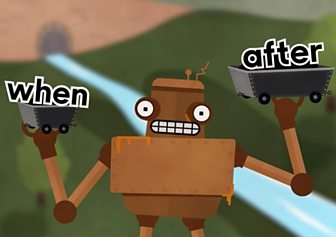Revising subordinating conjunctions
You have learnt about subordinating conjunctions in a previous lesson.
Today you’re going to revise what they are and use them independently in your writing.
Let’s recap
Subordinating conjunctions:
- Are the words that link a main clause and a subordinate clause together in a sentence.
- Help to add the extra information that tells us when, why or where something happens.
- Are words such as ‘because’, ‘as’, ‘while’, ‘until’, ‘so’.
For example:
He was annoyed because the train had stopped.
- ‘He was annoyed’ is the main clause. It makes sense on its own.
- ‘Because the train had stopped’ is the subordinate clause. It adds information to the main clause and needs the main clause to make sense.
- ‘Because’ is the subordinating conjunction. It helps to add the information to explain why he was annoyed.
Top tip!
Subordinating conjunctions can also go at the start of sentences. When this happens, the whole subordinate clause moves too and is followed by a comma.
For example:
Because the train had stopped, he was annoyed.

Visit the BBC Bitesize page to see the videos and activities.





